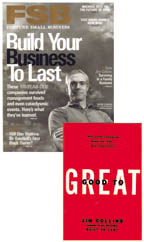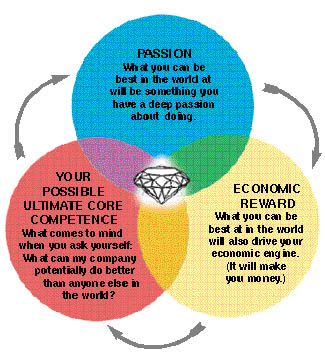What are you better at than anyone else? The future of your business depends upon your answer.

Just Another Fad, Or The Real Thing? Jim Collins burst upon the management scene several years ago with his book: “Built to Last.” It was meticulously researched and told the story of eighteen of America’s longest lasting companies. But, some people complained: “These companies started out great and stayed that way. We have a good company, but how do we become a great company?” This stimulated four years of careful research by a dedicated team. The result was “Good to Great,” one of the most valuable business books of the last decade.
Know thyself. That was the advice of Plato, and it is also the advice of Jim Collins who wrote the explosive best seller, Good to Great.
If you have a good company and are satisfied, this article is not for you because the first thing Jim Collins discovered is that good is the enemy of great. He engaged in an intense five-year research project, studying companies that had performed as good companies for quite some time, and then skyrocketed to greatness. He discovered some other rather startling things about these companies that moved from good to great. Yet, of all the things he discovered, one thing looms above all: Any company can greatly improve its stature and performance, perhaps even become great, if it conscientiously applies the principles his team uncovered.
A few companies I work with, small and large companies, have embarked upon the adventure of applying Jim Collin’s Good to Great Disciplines. These are good companies with remarkable Visionary Leaders at the top. Each one, without exception, has made remarkable improvements by following the Six Disciplines. Whether they become great companies or not remains to be seen. But if you are not satisfied with being merely a good company, and want to break out into the open air, I advise you to weigh and apply the Six Disciplines for yourself.
Please note that the first two of the six Disciplines involve people. The second two Disciplines involve thought. The third set of Disciplines involve action.
THE SIX GOOD TO GREAT DISCIPLINES
A Visionary Leader Is Required To Drive The Breakthrough. Contrary to conventional wisdom, visionary leaders are not generally charismatic, driving, egotists. Collins learned that the most effective leader is an individual with quiet, driving passion. This person is incredibly ambitious, but not for self. He or she is ambitious for the company. They do not seek credit for what is done, but quietly lets others take the bows.
Get the Right People on the Bus, get the Wrong People Off. People are not your most important asset, the right people are. These are people who buy into your core values. Don’t waste time trying to fix the people who don’t. If they do embrace your values, make sure they are in the “right seat on the bus”. Once the right people are in place, then set the Vision and go for it. This concept is in contrast to the idea of a genius leader who sets the Vision and then enlists highly talented helpers to realize the Vision. This model fails when the genius leaves.
Confront The Brutal Facts, But Never Lose Faith. The primary task of a Good to Great Leader is to create a culture in which people have a tremendous opportunity to be heard. Very few furniture stores have a system in place that permits this. Once people are heard, the truth will emerge, and the facts can be faced. Hit the tough decisions head-on and you will be a stronger company. Have absolute faith that your company will prevail and prosper in the end, and AT THE SAME TIME confront the most difficult facts of your own reality. The best way to de-motivate good people is to put your head in the sand.
Discover What You Are The Best At In The World… Know Thyself. This, in my judgment, is the most critically important and hardest to execute of all the Six Disciplines. Go through the process of learning what it is you really can be best at, and forget what you would only like to be best at. This discipline is a much higher bar than a core competence. It is what I call an Ultimate Core Competency, a UCC. You can be good at something, but that is not what will take you over the top. Focus fanatically upon your single UCC. I will elaborate on this key to greatness later.
Build A Culture Of Discipline … With Freedom Comes Responsibility. With the right people on the bus, build a culture of self-disciplined people who have the freedom to take disciplined action and who understand the responsibility that goes along with this freedom. These are also people who understand what you are best at in the world, and who are incredibly intense about their focus on this UCC, or Ultimate Core Competence. They are not diverted into wasting energies on activities outside of this UCC.
Learn To Think Differently About Technology. Does it Fit into Your UCC? If it does, then embrace it and become a pioneer in it. If it does not, shun it. Technology can accelerate your momentum, it cannot create it. Think of technology as 20% of the driving force, and the culture of your organization as 80%. Take your time with technology… a good philosophy is still: crawl, walk, run.
REVISITING YOUR ULTIMATE CORE COMPETENCY
Once more I ask the question: what do you do better than anyone else in the world? It took the average Good to Great company four years to answer this question. Fortunately, Collins explains the process by which they arrived at the answer. It is a kind of a mind game that you must play if you want to raise your business to another level.
There is a lot of junk out there. There are management faddists everywhere, wild eyed visionaries, and lots of confusing information. What stands out is simplicity. Passionate focus. Your UCC, or Ultimate Core Competence, is your Brand (if you are successful). It is what you are best at in the world and what comes to mind when people think about your company. Your UCC is what drives your economic engine. And finally, your UCC is what lights your fire… what you are most deeply passionate about. If you are not certain about what this UCC is for you, try the following mind challenge.
Imagine you are free to design the work life you want. This work life must meet three criteria. FIRST, it must be work that you are gifted at. You must have a remarkable ability to do this work; it must be something you were destined to do. SECOND, this work must be financially rewarding. "Man, they pay me for this? This is great!" THIRD, the work must be something you can lose yourself in, you are passionate about, that resonates with every fiber of your being. (See the Three Circles of Corporate Destiny exhibit on page 40). Note how these three circles intersect. Collins discovered that if you direct your life energies to this intersection, and translate this into a touchstone that guides your life choices, you will have found your Ultimate Core Competency.
Understanding what you can be best at, and also what you cannot be best at, is the key to building a great company. The crucial distinction is that your UCC is not something you are striving to be the very best at, but rather the single thing you are convinced you can be the very best at. It is important to understand the difference. If you are good at something, and focus on that, you will only rise to the level of being good. However, if you focus solely on what your organization can potentially do better than any other organization, then you can be walking on the path to greatness.
Circuit City became the greatest at implementing the "4-S" – Selection, Service, Savings and Satisfaction. Between 1982 and 1997, they grew 18.5 times the market. Kroger became the very best innovative, super-combo store and grew 4.17 times the market between 1973 and 1988. Walgreen’s became the best at being a super convenient drug store, and grew 7.34 times the market between 1975 and 1990. You can see Collin’s book for more examples, but you get the idea.
But, what if you go through the process described and you still can’t define your UCC? What do you do then? You do the process again… and again. Remember, it took the average Good to Great Company four years to fully define their UCC. It is a process, and while you will continuously improve throughout this process, your ideas will not reach full maturity until you work hard at defining them. It is a very difficult endeavor, but once done, everything else becomes easy. Collins suggests developing a council of five to twelve of the right people to go through this process with you.
How can you sustain this process? What if you never find the UCC that is your company’s bus to greatness? Collins tells us we must maintain faith that our UCC is there … we have to keep looking until we find it. Face the brutal facts, but keep the faith. The process is arduous, but the rewards are spectacular. As you settle on a crystal clear UCC, everything else also clarifies. You have a touchstone by which everything you do can be measured. Guided by your UCC, you will ask the right questions. Debates and dialogues within the company will be directed by your UCC. Executive decisions will be measured by your UCC. And, evaluations and analysis will be easier and more valuable when tested against your UCC.
There is not, nor has there ever been a magic road to greatness. But there does exist within every good company the seeds of becoming even better. With the right people, the right thought, and the right actions, the possibilities are limitless. The times are shaking out the dishonest, the fake, the businesses based upon bravado and deception. Beyond this, not so far away, lies the next great economic boom. My advice is to begin to get ready for it now, so you can hit the ground running when it comes. Plan wisely, and your competitors will be standing around wondering what happened.
 |
The Three Circles
of Corporate Destiny
(Based on the “Hedgehog Concept” of Jim Collins)
Your UCC (Ultimate Core Competence) must be something you or your organization is gifted at. SECOND, this work must be financially rewarding. THIRD, the work must be something you can lose yourself in, you are passionate about and resonates with every fiber of your being. Note how these three circles intersect.
Collins discovered that if you direct your life energies to this intersection, and translate this into a touchstone that guides your life choices, you will have found your Ultimate Core Competence...
a “diamond” of great value. |
Larry Mullins, President of UltraSales, Inc., has 30+ years experience in the front lines of retail furniture marketing. Larry's mainstream executive experience, his creative work for "promoter-specialists," and study of advertising principles has enabled him to continually develop new High-Impact strategies for independent furniture retailers that are sound, complete, and innovative. Inquiries can be sent to Larry care of FURNITURE WORLD at editor@furninfo.com.